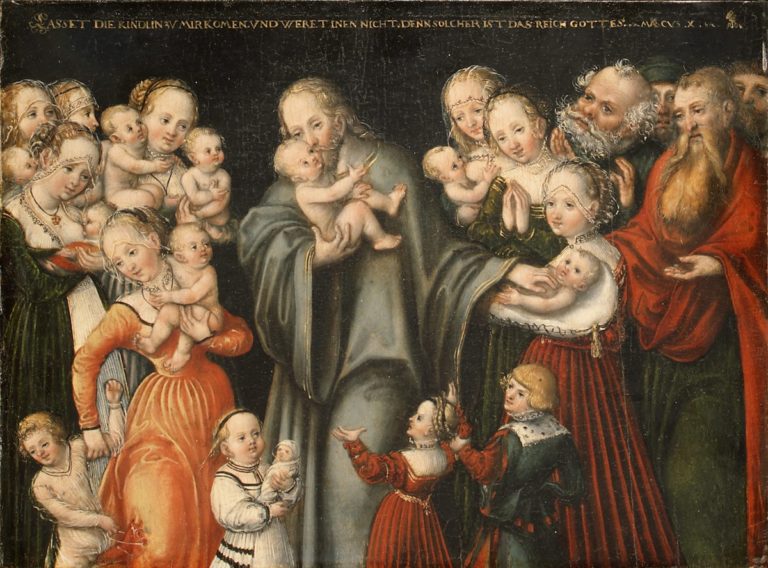In The Goal of Education Part I we saw the foolishness of Educating for Mammon, that is, bringing up children with the primary goal of turning them into moneymakers. But what is the alternative? Fortunately, as with so many things, we don’t have to invent a solution. Educating for Mammon has long been a problem, and the Church has often addressed it.
Educating for Mammon was a problem in the fourth century when a pastor named John Chrysostom was preaching through the book of Ephesians. He came to Ephesians 6:4, “And, ye fathers, provoke not your children to wrath: but bring them up in the nurture and admonition of the Lord,” and here’s part of what he said:
How long are we going to be mere flesh? How long are we going to hunch over the earth? Let all things stand in the second place for us when compared with taking forethought for our children and bringing them up in the discipline and instruction of the Lord. If he learns to be a lover of wisdom from the first, he has acquired riches greater than all riches, and a mightier glory. You will accomplish nothing so great by teaching him a craft, and the outward training through which he will acquire possessions, than if you teach him a craft through which he will despise possessions. If you want to make him rich, do it like that. For the rich man is not he who binds himself with many possessions and surrounds himself with many things, but he who has need of nothing.
Discipline your son in this, teach him this – this is the greatest wealth. Do not seek how you will make him renowned in outward lessons, and make him glorious, but consider how you will teach him to despise the glory that is in this life. Thence he would become more radiant and more glorious. These things are possible both for the poor man and the rich man to do. One does not learn these things from a teacher, nor through craft, but through the divine sayings. Do not seek how he will live a long life here, but how he will live a boundless and endless life there. Give him the great things, not the little things.
(Ephesians, Homily XXI)
Nor was the problem of Educating for Mammon limited to the fourth century. In the sixteenth century Martin Luther wrote in his Large Catechism:
Nor is it recognized how very necessary it is to devote serious attention to the young. For if we want capable and qualified people for both the civil and the spiritual realms, we really must spare no effort, time, and expense in teaching and educating our children to serve God and the world. We must not think only of amassing money and property for them. God can provide for them and make them rich without our help, as indeed he does daily. But he has given us children and entrusted them to us precisely so that we may raise and govern them according to his will; otherwise, God would have no need of fathers and mothers. Therefore let all people know that it is their chief duty – at the risk of losing divine grace – first to bring up their children in the fear and knowledge of God, and, then, if they are so gifted, also to have them engage in formal study and learn so that they may be of service wherever they are needed.
(Large Catechism, I.170-174)
Fides ad Deum, Caritas ad Vicinum
With one voice Chrysostom and Luther lambaste the practice of Educating for Mammon; they unite also in the remedy. They point us to the two marks of the Christian life: faith and love. Throughout all of Scripture, faith and love characterize God’s people. And each is directed toward someone. Faith is directed toward God; we trust in Him and expect to receive every good thing from Him, which he gives freely for the sake of Christ in spite of the fact that we don’t deserve any of it. Love is directed toward the neighbor; good works are the fruit of faith, and we don’t use these works to earn anything with God, but to serve our fellow man. Put faith and love together, and we have a fine motto to keep us mindful of the goal of Christian education: Fides ad Deum, caritas ad vicinum, “Faith toward God, love toward the neighbor.”
Faith toward God
Let’s examine these two marks of the Christian in more detail. First faith. Faith is not something that we can manufacture within ourselves. Rather, it is something God works in us by his Word; as it says in Romans 10:17, “faith cometh by hearing, and hearing by the Word of God.” Thus Chrysostom returns to the language of Ephesians 6:4 again and again, “bring up your children in the discipline and instruction of the Lord,” meaning, teach them the Word of God, the “divine sayings,” as Chrysostom puts it. Luther likewise tells parents to teach their children God’s Word, saying that if they do not bring up their children in the fear and knowledge of God they risk losing divine grace, because this is the chief duty of parents.
Education should have faith as one of its goals. Education should treat a child like he has a soul, and not like mere flesh hunched over the earth. Education should delight in Christ, and the redemption that He has accomplished, and the words that He has spoken.
Love toward the Neighbor
Flowing from faith, the second mark of the Christian is love. Only one who has received the love of Christ can properly love his neighbor. Apart from Christ’s love we cannot love others. We can hate them, we can use them for our own ends, we can behave decently to avoid punishments, we can feel compelled by the general morality of those around us – but of ourselves we cannot love anyone else. Like faith, love is a gift of God. And indeed, wherever there is faith, there is love, just as wherever there is fire there is light and heat.
Education should include instruction in God’s Commandments and Christian morals. But more fundamental than teaching children to behave rightly, is the Christian attitude that we do not live to ourselves but to others. An education that teaches children to look to their own wants and needs is no education for a Christian. But when love is a goal of education, then the student learns to say, “How can I be of service to those around me? Teach me things so that I can better care for my neighbors.”
Chrysostom and Luther both stress that children should learn useful knowledge and skills – not useful for earning Mammon, but useful for the neighbor. So Luther said that the purpose of giving children a formal education is “so that they may be of service wherever they are needed.” Chrysostom comments at length, showing what a wonderful gift a Christian is to the world:
Thus the more he is renowned in this life, so much the more is this discipline necessary for him. For should he be brought up in palaces, there are many heathens and ‘philosophers’ and those puffed up with the present glory, just like some place that has been filled with dropsical people. Of some such sort are all the palaces: all are puffed up and inflamed, and those who are not are zealous to become so. Think, then, how great your son is, going in there like the best physician: entering with the instruments that are able to reduce the inflammation of each, and approaching each one and conversing, and making the sick body healthy, applying the medicines from the Scriptures and pouring out the words of philosophy…
And if you want to know, he will be a more serviceable man even in the world itself. For all will revere him because of those words when they see him in the fire, though not being burned nor desiring power. And at that very time he will be ready for it – when he does not desire it – and he will be still more revered by the king, for such a man will not be able to escape his notice. For among many healthy people, the healthy man will escape notice. But among many sick people, when one is healthy, the report will be spread quickly, and into the royal ears, and he will set him over many nations. Therefore, knowing these things, bring up your children in the discipline and instruction of the Lord.
(Ephesians, Homily XXI)
The True Goal
What is the goal of education? Not the acquisition of Mammon. The goal of education is Fides ad Deum, Caritas ad Vicinum, faith toward God, love toward the neighbor. Or as Chrysostom very nicely sums it up: Χριστιανὸν αὐτὸν ποίησον: Make him a Christian.
Painting: Christ Blessing the Children, by Lucas Cranach the Younger, c. 1545-1550
Quotes of Large Catechism are from The Book of Concord: The Confessions of the Evangelical Lutheran Church, ed. Kolb & Wengert
Scripture quotations are from the King James Version.
Translations of Chrysostom are my own.


